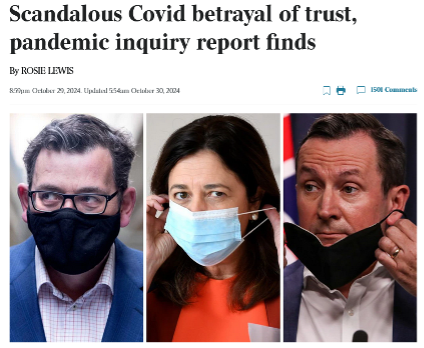Mr Butler was selling the erosion of public trust as the biggest consequence of the covid pandemic. Why not devote some real money to restoring it, then?
The response to the government’s response to the covid-19 response inquiry was – apart from being way too many responses – both baffling and entirely predictable.
The usual suspects in the Murdoch press threw up a photo of Dan Andrews and screamed “BETRAYAL” at the top of their lungs.

Given the three states with the toughest public health measures were all Labor-run states – Queensland, Victoria and WA – it’s no big surprise that Mr Butler was keen to deflect criticism of the Covid-19 Response Inquiry for not looking in detail at those decisions.
Speaking as someone who was living in Queensland at the time, I have utterly no problem with the decisions the state government made, albeit I didn’t have a relative in hospital or aged care on the other side of the border. I did have a mum in aged care here, though, and I have not a single complaint about the measures “Anna Palla” and her mob put in place.
My trust levels are all good, thanks.
This week the politicians on both sides threw predictable barbs. Mark Butler and Jim Chalmers had polite, if not particularly subtle digs at the Morrison government.
The treasurer on economic relief programs, for example:
“Labor called for and supported programs like JobKeeper, but we were very, very clear at the time that the support should have been rolled out faster and that it should have been better targeted,” he said.
“If it was better targeted, we could have provided more assistance to those who genuinely needed it by wasting less on the businesses, in particular, who didn’t need JobKeeper.
“And we know subsequently that billions and billions of dollars were wasted.
“The lack of planning, the delayed rollout, and the design choices of JobKeeper exacerbated skill shortages and inflationary pressures in our economy.”
Senator Ann Ruston and shadow treasurer Angus Taylor opted to play the man and not the ball.
“It has been clear from the get-go that this was a politically motivated inquiry,” they said.
“Labor has shown its true colours by politicising a once-in-a-generation pandemic.
“This is just the latest in Labor’s desperate attempt to blame everyone and everything but itself for its homegrown inflation.
“The Treasurer’s selective memory is on display. The Albanese Labor government spent more in the last financial year, than was spent to help Australians during the peak of the covid-19 pandemic.
“He also appears to have forgotten that Labor wanted the Coalition government to spend $81 billion on unnecessary measures such as paying Australians to get vaccinated.”
Blah, blah, blah.
Meanwhile the only substantive move made by the government in response (sorry!) to the inquiry’s report was to commit $251.7 million over four years to a permanent Centre for Disease Control.
That’s the grand total of about $63 million a year, for an organisation that is supposed to prevent, or at least minimise the impact of the next pandemic. The one we just went through – are still going through, frankly – cost $213 billion in economic support packages alone, not to mention the $31 billion black hole caused by the delay in the vaccine rollout.
Just over $60 million seems an incredibly small amount to pay – you could almost say grossly inadequate.
I felt for Professor Terry Slevin, boss of the Public Health Association of Australia, this week. Professor Slevin has been a vocal and passionate advocate for the CDC from the get-go – not just for its role in pandemic preparedness, but also for its potential in offsetting the burden of noncommunicable diseases.
From the outset he has been begging the government not to underfund the CDC. It got short shrift in the last federal budget.
“The absence of any budget line item for the ACDC suggests pandemic amnesia four years after the lives of everyone in Australia was upended,” said Professor Slevin at the time.
Death-riding the ACDC references in February, he said:
“We’ve only a few metres worth of funding for a Highway to Health. We can’t accept Dirty Deeds Done Dirt Cheap.”
Indeed.
But this week you could almost hear Professor Slevin gritting his teeth, grateful to be getting a CDC at all, albeit a year later than promised (1 January 2026) and with what feels like the bare minimum of funding.
“One way a government flags its priorities is by how it spends our money,” he said.
He didn’t need to say anymore, to be honest.
“In this case, the government responded to Labor’s 2022 election commitment to establish an Australian CDC by allocating $90 million in 2023 to create an interim Australian CDC, which has funding until 30 June 2025.
“[Yesterday] the Australian Government announced it will fund a permanent CDC with $251 million over the next four years and a commitment to ongoing funding.
“At roughly $60 million per annum it is a modest but vitally important launching point from which the CDC should grow.”
Quite.
If indeed the biggest effect of the covid pandemic and the governments’ responses to it were to erode public trust in not just politicians, but researchers and doctors as well, $60 million a year seems dismissive at best and criminally inadequate at worst.



